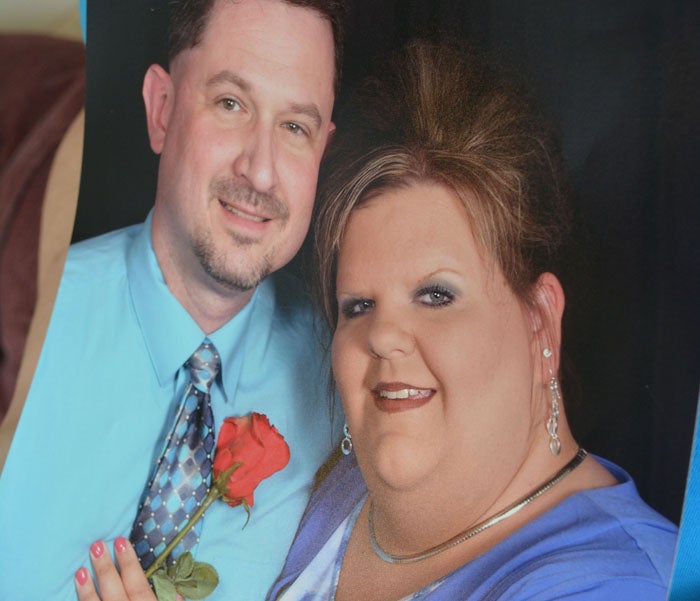Kidney transplant recipient now encourages others to take care of themselves
Published 12:00 am Friday, August 31, 2018

- Melissa Young holds a favorite picture of herself and her husband, John, who donated a kidney to her. They have been married for eight years.
By Susan Shinn Turner
For the Salisbury Post
SALISBURY — Melissa Young’s husband saved her life. Now, she wants to save yours.
For years, Young, 37, had uncontrolled blood pressure and Type 2 diabetes.
“It was just a lack of funds,” she said. “I felt like our other bills needed to be paid. If I would’ve realized the damage I was doing, things would have been different. That’s why I’m so adamant about telling my story now.”
By November 2016, Young was in kidney failure. She began dialysis in March 2017, three times a week. Sunday was her only good day of the week.
In January, Young and her husband, John, and her mother, Trudy Morgan, went to a transplant class at Wake Forest Baptist Medical Center. It was informative, but overwhelming.
Her mom wanted to be her donor, but she had health problems that prohibited her from donating. Young is an only child, and her father, Robert Darby, died 14 years ago.
Early on, John Young was determined to be Melissa’s donor. They’ve been together nine years and married for eight.
“I wanted to do it not only because I loved her, but because I took our marriage vows seriously,” says John, 48. “Everybody told me any other guys would have left. How could I expect her to stand by me if I don’t stand by her? I thought there was a reason I’m here — to give her a kidney.
“If she didn’t get one, she was going to die.”
So John started the donor phase at Baptist hospital. In March, Melissa was approved for the transplant list, but the wait can be three to five years. She didn’t want John to donate his kidney, but it was not up to her. It is up to the donor.
“He’s never had any stitches, no surgeries, no broken bones, nothing,” Melissa says. “He didn’t know what to expect, but he still stepped up to the plate and gave me a kidney.”
Surgery was scheduled for June 19, and Melissa completed her last dialysis session the day before.
“Everything went without a hitch,” she said.
Melissa’s new kidney started working almost immediately. She saw John the day after surgery.
“Once I knew he was OK, I just fell in love with him all over again,” she says. “Once I put my hand on him, I knew our life was going to be OK.”
Without a transplant, “she really couldn’t go on much longer,” says Jeff Taylor, a physician assistant with Trinity Medical Care. “We were running out of options. But the transplant was flawless.”
The two came home from the hospital June 22. Melissa is going for check-ups every other week but doing well.
“Any bad day I have is better than having to get up and go to dialysis,” she says. “I try to thank that man every day, because God used him to save my life.”
John has returned to work at Mueller Systems in Cleveland, where he’s worked for 19 years. His co-workers have been supportive, as has their church family at Carmel Baptist Church.
“We have the most wonderful church family I could imagine,” Melissa says. “We had such huge support on this journey, which is more important than anything.”
Melissa also praises John for keeping the household running during her illness.
“Since I went on dialysis in March, this man has done everything in this house,” she says. “He has had to bear the household load as well as working. Our household would not have made it without him. He’s the reason we’re still making it.”
“I’m just glad I was able to help her,” John says. “It simply amazes me how they could take a kidney out of one person and put it in another.”
John says he had no idea what Melissa was going through until he had to help her into the house after dialysis one day.
Two months after surgery, Melissa says things are great. She is taking their daughter, Nevaeh, 4, to pre-kindergarten this fall and taking her to the park. Eventually she wants to return to work as a practice manager at Alpha Family and Cosmetic Dentistry.
And she wants others not to make the mistake she did.
“You have to take care of yourself,” she says. “There are things that can happen years later that can affect you. If I would have known eight years ago that not taking my medicine would make me need a kidney, I would not have needed a transplant at 36. Take your medicine. You never know how later in life it’s gonna affect you.”
The transplant, Jeff says, “bought her a life, honestly. She’s very compliant, and takes things seriously. She watches her numbers. There’s a universal poor compliance with younger people and those diseases. They think, ‘I’m young; it’s not gonna happen to me.’ But for Melissa, all that’s changed now.”




